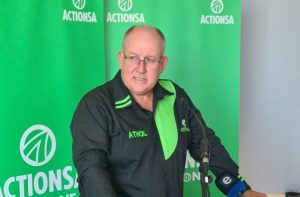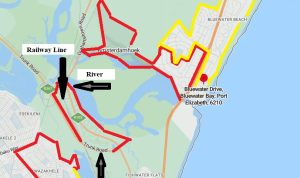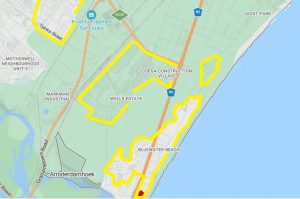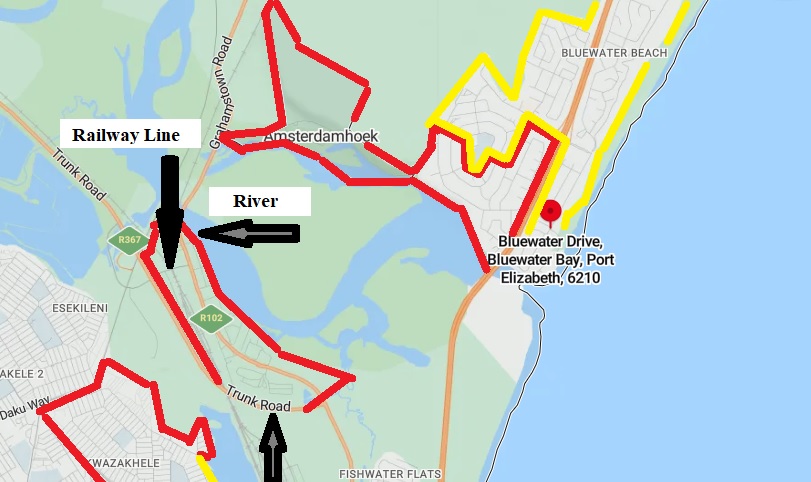By David Bamber, Editor
The Democratic Alliance (DA) and Action SA (ACTSA) say they are keeping an eye open for any “gerrymandering” ahead of the National and Provincial Elections that will take place between mid-May and mid-August next year.
Gerrymandering occurs when a political party changes electoral boundaries for political purposes, rather than in the interests of the residents of a particular voting area, as happened in the Bluewater Bay Ward 60 prior the 2021 Municipal Elections.
Until 2020, the entire suburb of Bluewater Bay was demarcated within Ward 60 but the powers that be decided to split the suburb into two wards – Ward 60 and Ward 16.
In response to written questions, DA Eastern Cape Leader, Andrew Whitfield, told the Echo, the DA considers any changes to ward and municipal boundaries on a political basis to be irrational and flawed. It would, however, appear that the DA took their eye off the ball when it came to Bluewater Bay because although the DA did object to the entire process which they labeled “fatally flawed” Whitfield conceded that it is not always possible to make submissions on every ward.

Whitfield said: “There will only be re-determination of Ward boundaries again in 2025 ahead of the Local Government elections in 2026. We will keep a very close eye on this process as always and make every effort to put in submissions on every ward.”
Whilst that is true, work on delimitation usually starts two years before the elections (2019 last time ahead of the 2021 elections), so that decisions on the submissions can take place a minimum of 10 months ahead of the 2026 elections. This means that the initial work should start before the end of 2024 – next year!
However, what makes it easier for any political party to fight against gerrymandering, is the input of the residents of the various wards.
Whitfield also noted that gerrymandering is “an age-old practice perfected in the USA and adopted elsewhere in the world.”
Action SA Leader, Athol Trollip agreed and brought it even closer to home when he told the Echo: “If you wish to use Bluewater Bay as an example, research what the Nats (National Party in the old South Africa) did to that constituency to rob the UP (United Party) of this constituency by incorporating/re demarcating Somerset East into that constituency.”

In his written response to questions, Trollip said: “The MDB is a law unto itself, and gerrymandering is the tool of choice to entrench omnipotent governing parties. This tactic is facilitated by an apathetic voting public. ActionSA will and does oppose such skulduggery but it needs public mobilisation and opposition.”
At this stage, let’s look at what happened in Bluewater Bay prior the 2021 Local Government (Municipal) Elections.
As Ward 60, the suburb had one Councillor, Mvuzo Mbelekane, a young energetic ANC councillor, who was popular across the community as he always tried to keep residents informed about various service delivery problems, responded to messages and tried his best to solve problems. Mbelekane had previously been involved in the Ward 60 CPF and made himself available for events such as the Bluewater Bay Surf Lifesaving AGM and to the BWB Residents Association.

What lay behind the ANC’s decision to dump Mbelekane is unknown, but the change in demarcation left the suburb with two councillors that have, quite frankly, been missing in action, leaving it up to Representative Councillors of the Democratic Alliance (DA) to fill the void.
The Echo investigated the procedures that should be followed when undertaking changes to municipal ward boundaries and found that what happened in Bluewater Bay breached a number of the main guidelines laid down by the national Municipal Demarcation Board. The following guidelines were copied directly from the Municipal Demarcation Board’s CIRCULAR 1/2020: DELIMITATION OF WARDS 2019-2020 – PREPARATION PUBLIC CONSULTATIONS.
The clustered voting districts must form the proposed alternative ward, and must comply with the following:
i. Only voting districts must be used as building blocks for each ward.
ii. The clustered voting districts must be adjacent so as to ensure that wards are contiguous.
iii. Voting districts may only be split if totally unavoidable as any split of a voting district will require the reregistration of voters in that voting district.
iv. Keep the number of voters per ward, as close as possible to the norm to avoid ward that will not be illegal. (Minimum and maximum parameters considered). v. The total number of registered voters in the ward (as per the VDs), may not be more, or less, than the number of registered voters allowed per ward for the particular municipality.
vi. Take physical characteristics into account e.g. adequate road networks, and physical barriers such as freeways, rivers, mountains, etc.
vii. Keep the current ward numbers as far as possible as they are.
viii. Do not split obvious communities/groupings of villages/suburbs, traditional areas etc. – if at all possible.
The next phase in the ward delimitation process will involve public consultations. Members of the public will be given an opportunity to make proposals on how their wards should be configured.
The Echo has highlighted the important points above which we believe should result in a new delimitation of the Bluewater Bay wards for the 2026 Municipal Elections. It is absolutely clear from point iii and point viii that the splitting of any district or suburb should be avoided if at all possible. Point ii makes it clear that voting districts must me contiguous (connected to each other).

The fact is in Ward 16. neither Swartkops nor Kwazakhele are even remotely connected to Bluewater Bay whilst point vi places an even bigger obstacle in the way of a contiguous district – there is a river in between Bluewater Bay and Swartkops whilst there is a railway line between Swartkops and Kwazakhele, making two physical characteristics that should have been taken into account in the demarcation process.

It is a similar story in Ward 60, which also consists of a number of unconnected districts.
And, once again, there are other “obstacles” such as railway line that should have been forming natural boundaries.
Finally, the Municipal Demarcation Board did clearly not have adequate consultation with the residents of Bluewater Bay as few residents appeared to be aware of the changes in boundaries until they were announced.
There are two main reasons why the Echo believes that the MDB guidelines listed earlier should be adhered to: first, we need a councillor that is answerable to the residents of this suburb; second, the needs of Bluewater Bay are very different to those of, say, Kwazakhele (whose needs will be greater than ours). It will make no difference to the amount of money available to either Kwazakhele or Bluewater Bay as the budget is decided on by the whole Municipal Council.
For the Echo – it is merely a case of a good democracy.

